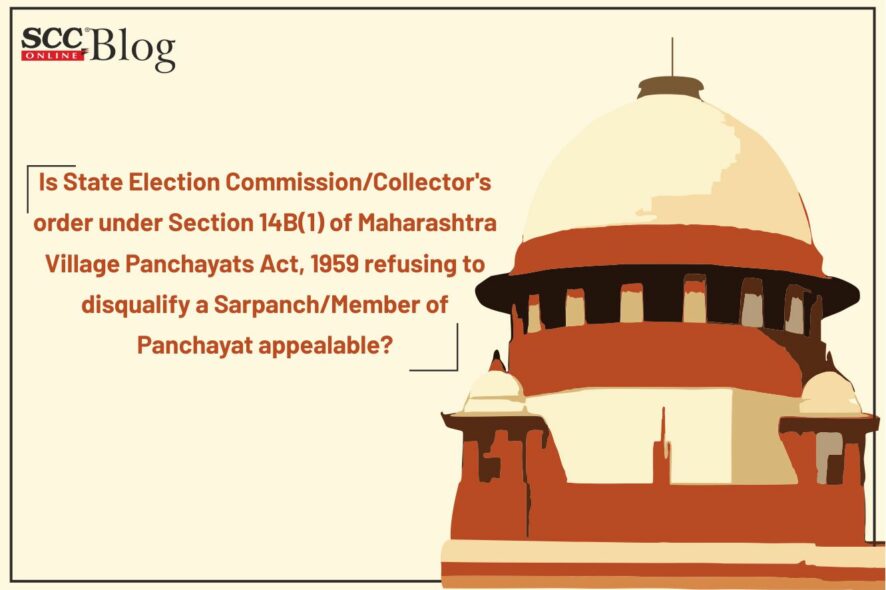Supreme Court: Answering an interesting question of law, the Bench of AM Khanwilkar* and CT Ravikumar, JJ has held that no remedy of appeal is envisaged against an order of the State Election Commission or its delegatee – the Collector, under Section 14B(1) of the Maharashtra Village Panchayats Act, 1959, rejecting the complaint or to drop the proceedings for declaration of a Sarpanch/Member having incurred disqualification.
The Court explained that such order becomes final and if passed by the Collector as the delegatee, is deemed to have been passed by the State Election Commission itself. Even the State Election Commission cannot step in thereafter in any manner much less in the guise of reconsideration or review of such order. It must follow that the Divisional Commissioner would have no jurisdiction (ab initio) to entertain assail to such an order of the Collector.
Issue
Whether an appeal could be filed before the Divisional Commissioner against an order passed by the Collector under Section 14B(1) of the Maharashtra Village Panchayats Act, 1959, declining to disqualify a Sarpanch/Member of the Panchayat for allegedly having failed to lodge an account of election expenses within the time and in the manner prescribed by the State Election Commission, without offering any good reason or justification for such failure?
Analysis
No appeal is provided against the order of Collector (or of State Election Commission) refusing to disqualify the Sarpanch/Member under Section 14B(1). Similarly, no appeal is provided even against the order of the Divisional Commissioner (or of State Election Commission) under Section 14B(2). A limited window against the order under Section 14B(1) passed by the Collector (or State Election Commission itself) declaring the Sarpanch/Member of a Panchayat as disqualified, is kept open before the Divisional Commissioner (or the State Election Commissioner, if the order under Section 14B(1) is or were to be 10 passed by the State Election Commission itself) – to remove such disqualification or to reduce the period thereof in deserving cases. To put it tersely, for the nature of power exercised by the State Election Commission under Section 14B, no remedy of appeal is envisioned by the statute.
The power of the State Election Commission, bestowed under sub-Section (1) or (2) of Section 14B, though concerns subject of disqualification of a person, it operates in two different silos. In that, the power under Section 14B(2) gets triggered only after an order of disqualification is passed under Section 14B(1). The former is not activated at all in a case where the application or the proceedings to declare the Sarpanch/Member as disqualified, is rejected or dropped.
“Taking any other view would inevitably result in a situation where the power exercised by the State Election Commission under Section 14B(1) could be appealed against before itself (its delegatee). That cannot be countenanced. For, an appeal cannot lie before the same Authority/functionary who had passed the order of rejection of prayer to declare the member concerned as disqualified. Sans an express statutory intent to provide appeal against the order rejecting application to declare a person disqualified, it must follow that upon passing such order the power under Section 14B is fully exhausted by the State Election Commission (or its delegatee, as the case may be).”
Indubitably, an authority rejecting the proposal regarding disqualification, cannot sit “in appeal” over its own order of rejection. Notably, there is no express power bestowed upon the State Election Commission or its delegatee to review its own decision passed under Section 14B(1) or 14B(2) of the Act, as the case may be.
Concededly, Section 16 is a provision which speaks about the disability from continuing as the member of a Panchayat, consequent to incurring disqualification or has been so declared under Section 14 of the Act. Once a Sarpanch/Member is disqualified under Section 14B by virtue of an order under Section 14B(1), it would give rise to two situations –
First, the person concerned can invoke option under Section 14B(2) for removal of his disqualification or for reduction of the period of such disqualification.
Second, the obligation fastened upon the Collector to decide the issue as to whether vacancy has occurred on account of such disqualification.
That question is required to be answered by the Collector in the first instance, in terms of Section 16(2) and to take follow-up steps thereafter in filling up such vacancy. The decision of the Collector on such question, referable to sub¬Section (2) of Section 16, however, has explicitly been made appealable before the State Government or the delegate of the State Government. That is, completely, a different regime albeit a consequence of process referred to in Section 14B(1) to declare a Sarpanch or a member as having incurred disqualification.
“This question decided by the Collector, is essentially in his capacity as a delegatee of the State Election Commission and, de jure, deemed to have been decided by the State Election Commission itself. Be that as it may, the question decided by the Collector under Section is, in one sense, a ministerial act bestowed upon him to ascertain whether vacancy had arisen as a consequence of the disqualification order and to fill up such vacancy.”
Hence, if the State Election Commission or its delegatee were to reject or drop the proceedings against the concerned person or member initiated under Section 14B(1), as being devoid of merits or for any other reason, the complainant does not have remedy of appeal against such decision. Such an order becomes final and is not appealable at all. Indeed, it can be assailed before the constitutional court under Article 226 of the Constitution of India.
[Shobhabai Narayan Shinde v. Divisional Commissioner, Nashik Division, 2022 SCC OnLine SC 7, decided on 04.01.2022]
Counsels
For appellants: Advocate Sudhanshu S. Choudhari
For respondent: Advocate Nishant R. Katneshwarkar
*Judgment by: Justice AM Khanwilkar







